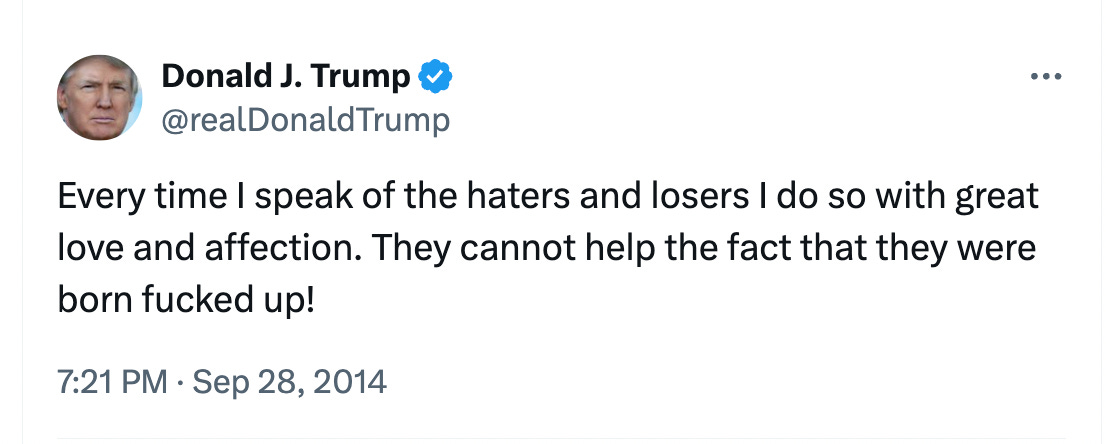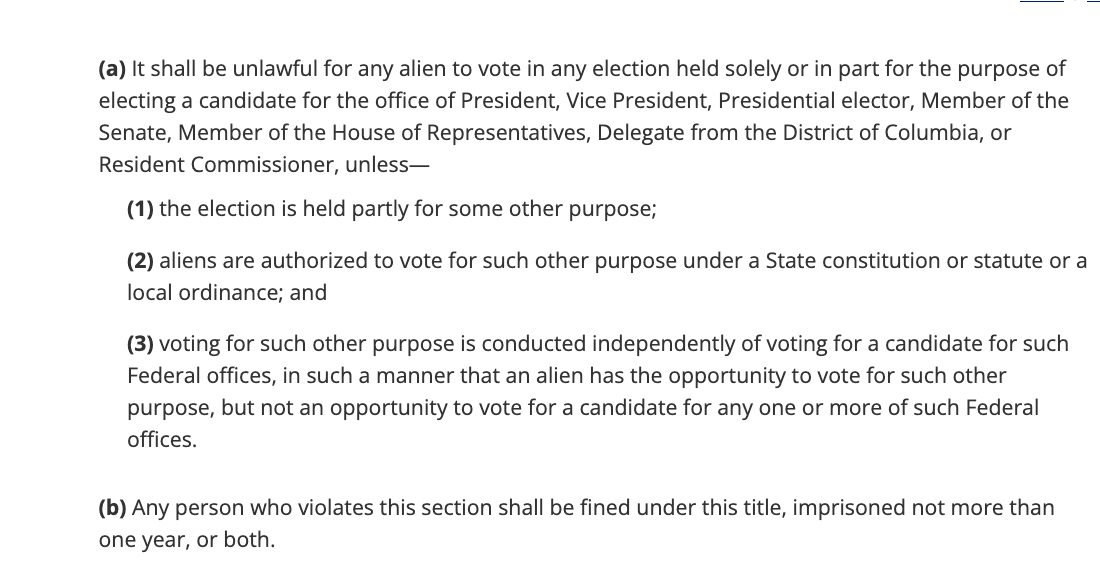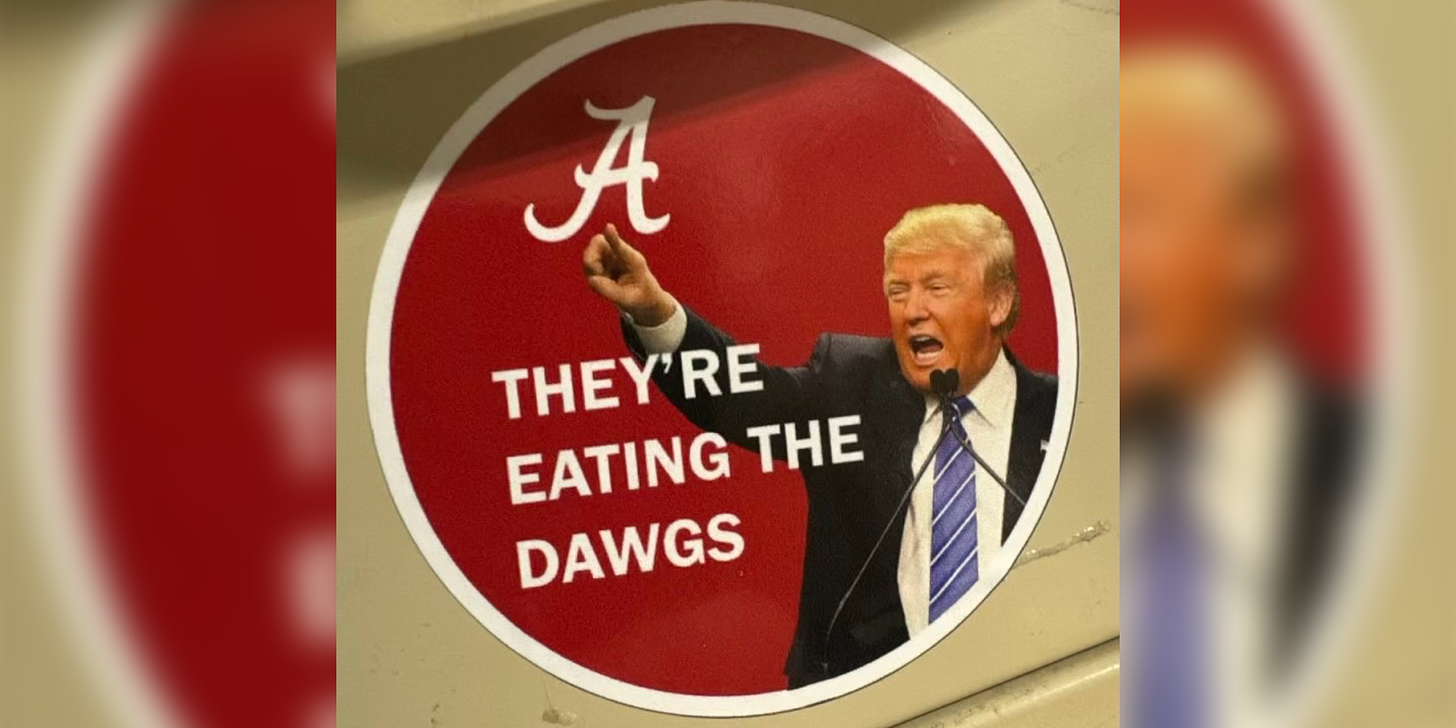Trump Should Learn How to Take a Loss From the Georgia Bulldogs
Instead, he wants to take away some people's rights to vote.
Donald Trump is at the Alabama-Georgia game tonight. I’m not celebrating that appearance, but I am here to remind everyone of the 10-year anniversary of this Trump Tweet from September 28, 2014. Everything we needed to know about him was apparent two years before the 2016 election, and yet, here we are.
Trump was never presidential material. Increasingly, it’s clear that he knows a majority of American voters understand that. He’s preparing for a new version of what he tried to do, unsuccessfully, after losing in 2020. This is a little long for a Saturday night, but it’s important, so I hope you’ll read on.
Last night, in Five Questions with Jen Rubin, we discussed an argument that’s now in vogue with Trump’s followers, especially the ones who are elected officials in red states. It’s the claim that “illegal aliens” are voting and poised to “steal” the election from him, even though that’s a lie.
Noncitizens can’t just walk across the border and register to vote, which seems to be Trump’s theme here. It’s a federal crime for noncitizens to vote in a presidential election, prohibited by Title 18 of the U.S. Code, Section 611.
And, despite the lack of any evidence to suggest noncitizen voting is a problem, last January, Trump began ginning up concern that it is. He knit together two ideas with tremendous appeal to his base, although both are demonstrably false:
Our elections are compromised by enormous amounts of fraud
Democrats are ushering undocumented immigrants across the southern border and registering them to vote
It’s starting to look like that’s the basis for Trump’s new Big Lie for 2024. The Brennan Center for Justice studied 42 jurisdictions in connection with the 2016 election and found that out of 23.5 million votes cast, there were only about 30 cases of potential noncitizen voting. Thirty. And how would Trump explain immigrants being responsible for his loss when Republican senators and congresspeople win?
The truth is, existing methods for ensuring only citizens register to vote are adequate. Voters have to certify they are citizens when they register. States check before they are added to the rolls. In 2022, Georgia Secretary of State Brad Raffensperger audited state voter rolls in an effort to find noncitizens. He determined that 1,634 ineligible noncitizens attempted to register. But that was over a 25-year period, and election officials caught all of the applications. None of the individuals successfully registered to vote in Georgia.
A North Carolina audit in 2016 found 41 legal immigrants—not people who lack legal status to enter the country, which is Trump’s complaint—who had not yet become citizens, but voted nonetheless. This was out of a total of 4.8 million ballots cast, and when prosecutions ensued during Jeff Sessions’ time as Attorney General, many of the cases were dismissed or found to involve people who thought that they had completed all of the steps for citizenship but had missed something like a formal swearing-in ceremony. The small number of voters didn’t make a difference in any of the state’s elections.
In other words, it’s a very Trumpian solution in search of a problem. The miniscule number of noncitizens who register or try to are detected by the system and removed, and even in the rare cases where they may vote, the numbers are so small that they don’t “dilute” the voice of eligible voters in any way. They have no impact on the outcome of elections.
Republicans’ outsized solution is to require everyone to prove their citizenship to register to vote. But the only way to prove one’s citizenship is with a passport or a certified copy of a birth certificate. Some of the new Real IDs may be used for that purpose too, but you need to establish your citizenship with the other documents to get one. Not surprisingly, there are lots of people who don’t have easy access to those documents. That includes young people and students—new voters registering for the first time or voting in a new state. It also includes older people, unhoused people, and people without the financial resources to obtain the necessary proof, the kind of people Trump believes vote for Democrats.
Common sense helps us understand why this isn’t much of a problem: it doesn’t make sense for an individual or group of noncitizens to intentionally violate the law and register, risking prison and deportation, knowing that their vote won’t influence the outcome of anything, let alone the presidential election. It defies belief to think that people who have endured a difficult journey to get to this country would violate the law, with no expectation of gain at all, as soon as they get here. Like so many of Trump’s lies, as soon as you take a minute to think about it, it just doesn’t hold water.
Trump wants to disenfranchise legitimate voters, but of course, it’s also, as we discussed last night, about setting up a narrative that the outcome of this election can’t be trusted—only if Trump loses, of course.
It’s currently in vogue for red state officials to support Trump’s new lie. That takes us to Alabama, where Secretary of State Wes Allen, a Republican, recently announced that 3,251 people he claimed were previously identified as noncitizens by the federal government are being switched to inactive status on the state’s voter registration rolls.
The problem with Allen’s plan is that it’s routine immigrants to be assigned an alien number and then later become citizens who are qualified to register and vote. Allen removed those people from the voter rolls without making any effort to ascertain what their status was. In his press release he conceded that “it is possible that some of the individuals who were issued noncitizen identification numbers have, since receiving them, become naturalized citizens and are, therefore, eligible to vote. The process initiated by the Secretary of State’s Office will allow those naturalized citizens to update their information on a State of Alabama Voter Registration Form and, once verified, vote in the state’s election.” In other words, Allen put the burden on already properly registered voters to reestablish their qualified status. So much for protecting the right to vote. And, Allen made the changes less than 90 days before the election, which readers of Civil Discourse know he cannot do.
If Allen’s actions are permitted to stand, eligible voters could show up on election day thinking they are set to vote, only to learn they would be required to jump through additional, time-consuming hoops, likely requiring proof of citizenship that they wouldn’t have on hand. It is voter suppression justified by fake complaints of voter fraud. If it succeeds in Alabama, it will spread to other states.
Late yesterday, the Justice Department’s Civil Rights Division stepped in and sued Alabama and Secretary of State Allen, challenging the program to remove voters from election rolls because it was “too close to the Nov. 5 general election, in violation of the National Voter Registration Act of 1993 (NVRA).” Kristen Clarke, the Assistant Attorney General for the Civil Rights Division said: “Officials across the country should take heed of the National Voter Registration Act’s clear and unequivocal restrictions on systematic list maintenance efforts that fall within 90 days of an election. The Quiet Period Provision of federal law exists to prevent eligible voters from being removed from the rolls as a result of last-minute, error-prone efforts. The Justice Department will continue to use all the tools it has available to ensure that the voting rights of every eligible voter are protected.” Civil rights groups have also sued the state.
The Justice Department is asking the court for injunctive relief. They want voters to be able to vote on election day. They’re asking the court to prohibit additional Quiet Period violations and to order the secretary to make remedial mailings to educate eligible voters concerning the restoration of their rights. DOJ is also asking for training of local officials and poll workers to address “confusion and distrust among eligible voters accused of being noncitizens.”
Nothing keeps people away from the polls like making them fear arrest or deportation if they vote, even when they’re eligible to. When citizens are systematically deterred from voting or when their right is burdened by a government official who took an oath to uphold their rights, we know something is broken. And it’s been broken by Donald Trump. Trump is so afraid of the personal consequences if he loses the election that he has no qualms about interfering with the sacred right of Americans to vote.
Maybe Trump will learn from the gracious Georgia Bulldogs, who accepted their loss tonight, as unhappy as they were about it, shook hands, and walked away to lick their wounds. But we’d be foolish to count on that where Trump is concerned. Best to be prepared.
We’re in this together,
Joyce







Thanks, Joyce. It must frustrate you to no end that your Sec’y of State is such a bigoted louse. Happy that DOJ filed actions against him.
I’m so utterly sick of all of them. I truly hope the blue wave 🌊 washes them all into the cesspool they belong in, never to be heard from again! 💙💙💙VOTE BLUE up and down the ticket.